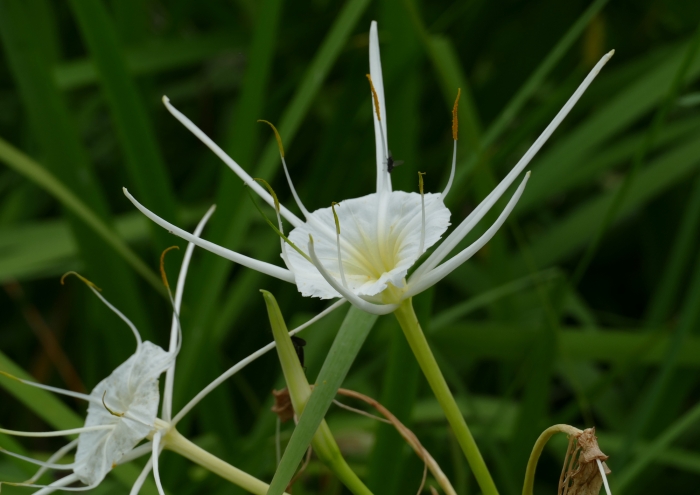Spring Spiderlily
(Hymenocallis liriosme)
Spring Spiderlily (Hymenocallis liriosme)
/
/

Wendy McCrady
CC BY 4.0
Image By:
Wendy McCrady
Recorded By:
Copyright:
CC BY 4.0
Copyright Notice:
Photo by: Wendy McCrady | License Type: CC BY 4.0 | License URL: http://creativecommons.org/licenses/by/4.0/ | Rights Holder: Wendy McCrady | Publisher: iNaturalist | Date Created: 2020-04-22T10:56:59-07:00 |





















































Estimated Native Range
Summary
Hymenocallis liriosme, commonly known as Spring Spiderlily, is a deciduous perennial bulb-forming herb native to wetlands, marshes, and along streams in the South-Central United States. It typically grows to a height of 3 feet (0.9 meters) and a width of 1-2 feet (0.3-0.6 meters). The Spring Spiderlily is characterized by its striking white flowers that bloom in the spring, each with a unique, spider-like appearance and a prominent yellow-green eye at the center of the corona, which adds to its ornamental value. The flowers are quite showy and can serve as a focal point in garden designs.
This plant is valued for its attractive blooms and is often used in water gardens, rain gardens, and as a naturalizing plant in moist areas of the landscape. It can also be grown in containers where its soil moisture can be carefully controlled. The Spring Spiderlily prefers full sun to part shade and requires medium amounts of water, thriving in soils with medium to slow drainage. While it is generally easy to maintain, it is important to ensure that the soil does not dry out completely. Gardeners should be aware that it may not flower if grown in too much shade or overly dry conditions.CC BY-SA 4.0
This plant is valued for its attractive blooms and is often used in water gardens, rain gardens, and as a naturalizing plant in moist areas of the landscape. It can also be grown in containers where its soil moisture can be carefully controlled. The Spring Spiderlily prefers full sun to part shade and requires medium amounts of water, thriving in soils with medium to slow drainage. While it is generally easy to maintain, it is important to ensure that the soil does not dry out completely. Gardeners should be aware that it may not flower if grown in too much shade or overly dry conditions.CC BY-SA 4.0
Plant Description
- Plant Type: Herb
- Height: 1-2 feet
- Width: 1-1.5 feet
- Growth Rate: Rapid
- Flower Color: White
- Flowering Season: Spring
- Leaf Retention: Deciduous
Growth Requirements
- Sun: Full Sun, Part Shade
- Water: Medium
- Drainage: Medium, Slow
Common Uses
Bee Garden, Bird Garden, Butterfly Garden, Deer Resistant, Fragrant, Hummingbird Garden, Low Maintenance, Potted Plant, Showy Flowers, Water Garden
Natural Habitat
Native to wetlands, marshes, and along streams in the South-Central United States
Other Names
Common Names: Texas Spider-Lily, Western Marsh Spider-Lily, Louisiana Marsh Spider-Lily, Spiderlily
Scientific Names: , Hymenocallis liriosme, Hymenocallis galvestonensis, Hymenocallis galvestonensis subsp. angustifolia, Choretis galvestonensis, Pancratium liriosme,
GBIF Accepted Name: Hymenocallis liriosme (Raf.) Shinners